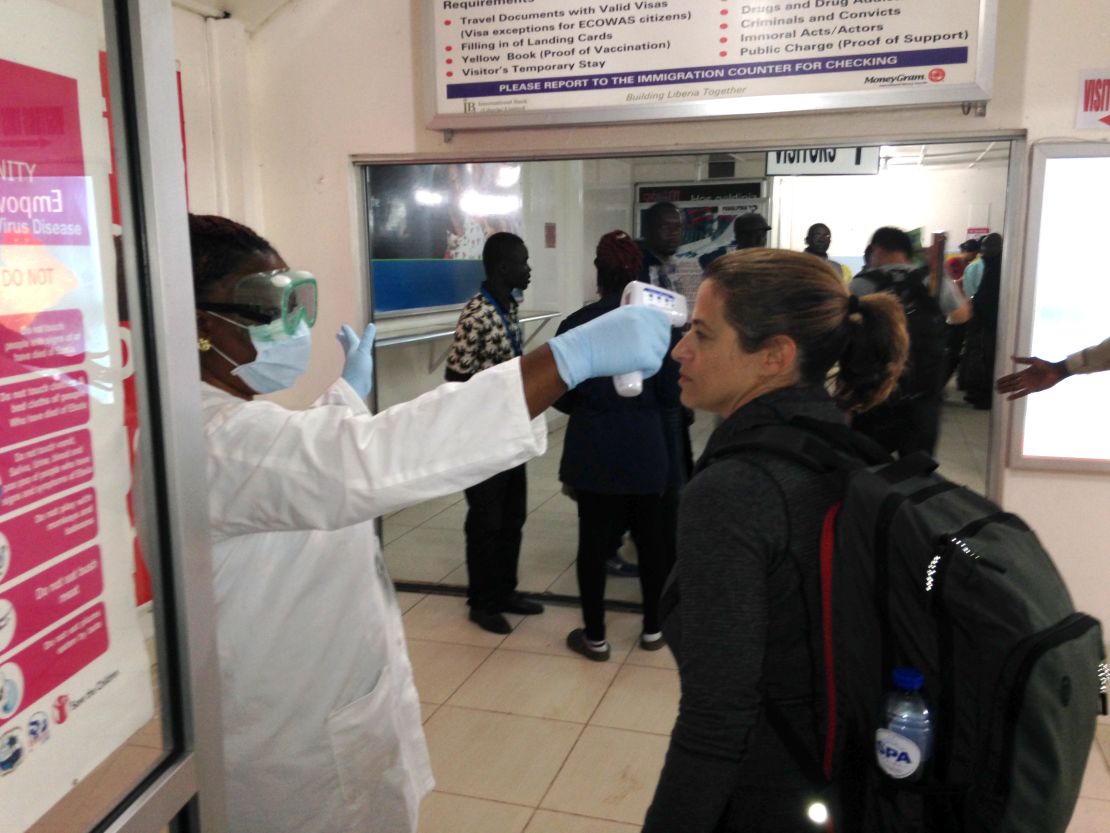Editor’s Note: CNN’s Elizabeth Cohen and John Bonifield arrived in Monrovia, Liberia, on Friday and are reporting on the Ebola outbreak.
Story highlights
Ebola has spread exponentially, not linearly
CNN team on the ground in Liberia to report on the outbreak
They must take their temperature twice every day as a precaution
Obama said earlier this week that the world knows how to fight this disease
As I stood in the sweltering heat outside the Centers for Disease Control and Prevention in Atlanta earlier this week, President Barack Obama whispered in my ear.
Okay, he didn’t exactly whisper, and his words were intended not just for me. In one of the most significant addresses of his presidency, Obama declared to the world that he would send 3,000 troops to Ebola-stricken West Africa.
Obama’s speech was being piped into my earpiece, and I was about to go on CNN when I picked up my phone and emailed my friend Jake Tapper, the host of the show.
“World knows how to fight this disease,” I wrote in the subject line, quoting the words I had just heard Obama speak.

In the body of the email, I wrote to Jake, “Does it?”
And that’s why I took an airplane to Liberia. I want to answer my own question.
The world knew how to fight Ebola outbreaks of the past, using a tried and true method I learned about in public health school: isolate sick people, trace their close contacts to see if they get sick, and if they do, isolate them and start the whole process over until the disease burns itself out.
But does the world know how to stop this Ebola outbreak?
Not to compare a deadly outbreak to a shampoo commercial, so please forgive me, but I think it explains the point:
If you’re over 40, you might remember that old Faberge shampoo ad – and they told two friends, and they told two friends, and so on and so on and so on, and the pictures of people replicate so by the end the screen is full of a multitude of little tiny faces who are using Faberge shampoo.
That’s what Ebola has become. It has spread exponentially, not linearly. There have been nearly 5,000 cases and 2,500 deaths in this outbreak – that’s more than all other outbreaks combined.
What you need to know about Ebola
The U.S. response to the current Ebola outbreak is surely impressive: 3,000 troops will build 17 hospitals. They’ll try to make sure medical supplies are getting in and out smoothly. A team of commissioned officers from the U.S. Public Health Service will staff a 25-bed hospital for healthcare workers who become ill.
But even with these resources, do we know how to stop an outbreak that’s gotten so out of hand? That’s unlike any other we’ve ever seen?
That’s what I’m trying to find out, and I’ll let you know what I learn.
So what do you pack to cover an Ebola outbreak? Thermometers – because at CNN it’s safety first, and we have to take our temperature twice every day and report it back.
Here’s what else you pack: tortillas, because they don’t get squished and they’re slow to grow mold, and peanut butter and jelly tortillas are very handy when you don’t have easy access to reliable food.
Life inside the Ebola outbreak
To prepare emotionally for this trip, I hugged everyone I knew at CNN (and a few I don’t know so well – sorry). I’m a hugger, and I wanted to get my hugs out, because there are no hugs on what is in public health parlance a “no-contact deployment.”
As we boarded the plane from Brussels to Monrovia, I introduced a public health worker I’d just met to my producer, John Bonifield. As she stretched her hand out to him she said, “This is our last handshake for this trip. No handshakes. No hugs. No kisses. And certainly no European kisses!”
Who says public health folks don’t have a sense of humor?
I already knew about the no-contact policy because Sophie-Jane Madden with Doctors without Borders had told me about Pierre Trbovic, a colleague of hers who was in charge of turning away people with Ebola from the hospital because there’s no more beds. He was the gatekeeper, and it was his job to say no.
As you might imagine, this assignment was traumatizing. When Trbovic had to turn away a woman with her baby and then watch the baby die in front of him, Madden couldn’t hug him. She had to console her friend from several feet away.
As I start this trip, I pray and hope for the people of West Africa, who have had to suffer so horribly. And I wonder – if the efforts put forth now had been made even just six months ago, maybe then we truly would have known how to fight this disease.




